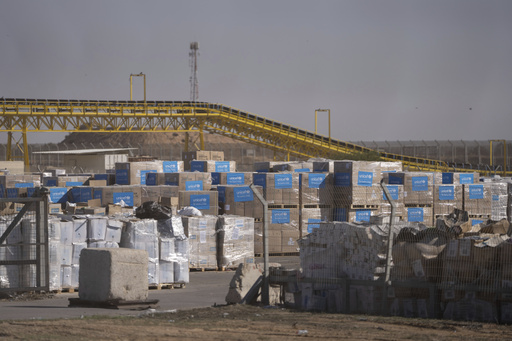
In Washington, concerns over severe starvation in northern Gaza are rising, with projections indicating that deaths could reach famine levels by next month due to Israel’s stringent blockade on food and aid. This worrying assessment was released by the Famine Early Warning System Network, a global initiative aimed at monitoring food crises, highlighting a potential divide within the U.S. government regarding the situation in the region.
U.S. Ambassador to Israel, Jacob Lew, expressed disagreement with aspects of the reported data, labeling the dire famine warning as “irresponsible.” He has raised questions about the validity of the information, suggesting that it’s based on outdated figures regarding the number of people still residing in northern Gaza.
The region has endured intense fighting and numerous limitations on humanitarian aid throughout the 14-month conflict with Hamas. Although there was a slight increase in aid deliveries into northern Gaza under pressure from President Joe Biden, recent reports indicate that assistance has been significantly curtailed. According to Oxfam, only nine U.N. trucks have managed to reach the area with food and water over the past 2.5 months.
Israel maintains that its operations in northern Gaza are aimed at combating the continued presence of Hamas militants. They argue that most residents have fled the area for Gaza City, which remains the primary destination for the aid being delivered. However, some critics, including former Israeli defense officials, have leveled accusations of ethnic cleansing against the country, particularly in the northern regions closer to its border.
The Famine Early Warning System Network anticipates that if current policies remain unchanged, the rate of starvation-related deaths could occur at a rate of between two and 15 individuals per day from next month through March. The international standard for declaring a famine is at least two deaths per day for every 10,000 individuals in a given area.
Cindy McCain, the American head of the United Nations World Food Program, emphasized the urgent need for a political push to ensure food and supplies reach Palestinians stranded in northern Gaza. During a recent appearance on CBS’ “Face the Nation,” she stated, “We need unfettered access. We need a ceasefire and we need it now. We can’t just stand by and allow these people to starve.”
The Famine Early Warning System Network was established in the mid-1980s by the U.S. Agency for International Development (USAID) to provide early alerts for global food crises. The Biden administration has provided unprecedented military support to Israel during the ongoing conflict. Concurrently, they have called for increased access to humanitarian aid in Gaza, cautioning that denying such access could lead to U.S. sanctions on military assistance.
Political support for Israel in its military actions in Gaza is a contentious issue within the United States. Both Republican and Democratic lawmakers have expressed opposition to limiting U.S. support over the humanitarian crisis affecting Palestinian civilians, while the Biden administration’s inability to exert more pressure on Israel regarding its treatment of civilians has been criticized, potentially impacting Democratic support in recent elections.
Ambassador Lew countered the famine warning via social media, arguing that the claims relied on “outdated and inaccurate” data. He highlighted the challenges in determining how many of the estimated 65,000 individuals remaining in northern Gaza had left, suggesting this uncertainty may taint the findings. Nevertheless, FEWS maintains that its assessment stands true even with a conservative estimate of 10,000 residents.
“We collaborate tirelessly with the U.N. and our Israeli partners to address the significant humanitarian needs on the ground. Relying on flawed data is not just inaccurate; it’s irresponsible,” Lew commented.

